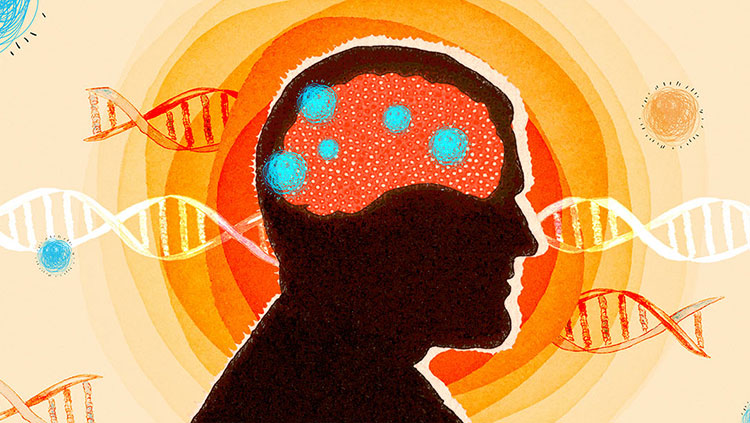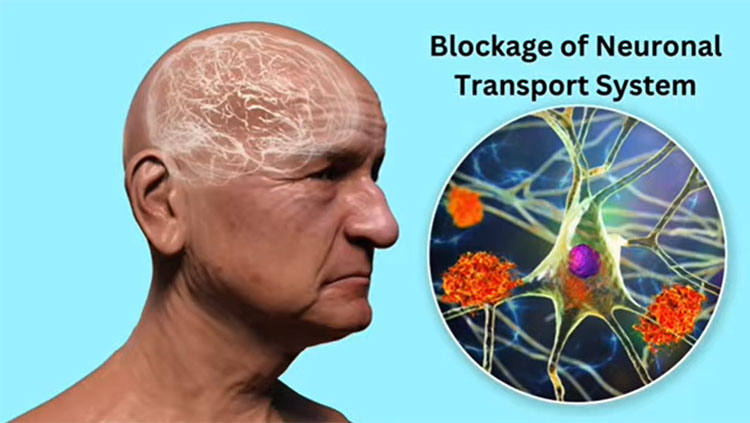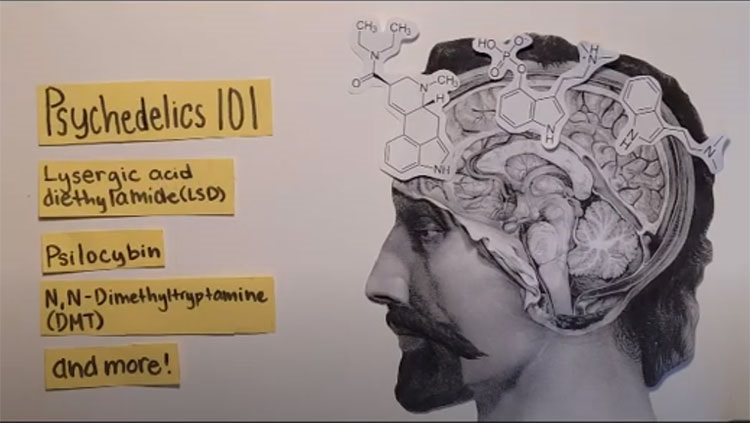Blood-Based Tests Offer Hope for Earlier Alzheimer’s Treatment
- Published30 Nov 2023
- Author RJ Mackenzie
- Source BrainFacts/SfN

Alzheimer’s disease often remains unnoticed until people experience memory loss or personality change. By this point, the disease has inflicted a devastating impact on the brain.
Following decades of failed attempts to develop effective treatments for Alzheimer’s disease, new therapies are beginning to emerge. However, they offer limited benefit for people with late-stage disease. New research, presented at the Society for Neuroscience’s annual meeting in November 2023, demonstrates significant steps toward enhancing simple tests for early Alzheimer’s diagnosis when current therapies would be most beneficial.
Identifying Alzheimer’s Early
Three brain biomarkers are used to commonly characterize Alzheimer’s: plaques of amyloid beta, a protein that builds up early in the disease course; neurofibrillary tangles of tau protein, closely linked to late-stage neurodegeneration; and brain shrinkage. These changes begin to occur “10 to 20 years before the onset of clinical symptoms,” says Yuanbing “Jason” Jiang, a researcher at Hong Kong University of Science and Technology (HKUST).
Currently, physicians rely on pricey neuroimaging assessments and invasive and painful spinal tap analysis to diagnose Alzheimer’s. Even so, these assessments typically result in a diagnosis at an advanced stage of the disease. Trials from newly emerging Alzheimer’s drugs like the FDA-approved Leqembi, an amyloid immunotherapy that binds to amyloid molecules and stops them from forming plaques, suggest the drugs are more effective when administered early in the disease. An earlier, routine test could get these new treatment options to patients when they are most effective.
Some blood tests for early Alzheimer’s diagnosis have recently been in development. They tend to examine the levels of biomarkers related to proteins and oligomers associated with Alzheimer’s. These tests have generally looked at a smaller handful of biomarkers when predicting Alzheimer’s.
Jiang and his colleagues developed a blood test that flags proteins linked to both Alzheimer’s and mild cognitive impairment (MCI), a condition where a patient experiences problems with thinking, like forgetfulness, without significant impacts on their day-to-day life. These problems are worse than would be expected for someone of the patient’s age, but not as severe as in Alzheimer’s. MCI often precedes dementia, but not every person with these impairments will progress to Alzheimer’s.
In research yet to be published, the team studied a group of 385 people in Hong Kong, using cognitive and imaging tests to assess whether people had Alzheimer’s, MCI, or normal cognitive function. The team then measured over 1,000 proteins in blood samples donated by the volunteers and grouped 18 of these protein biomarkers into a combined test called a panel. They used this panel to assess disease status in a second group of 50 people. “This 18-protein biomarker panel can accurately distinguish MCI and Alzheimer’s from cognitively normal individuals with an accuracy above 97%,” said Jiang. The team only needed a small sample of blood to make their assessment, suggesting the test is both accurate and minimally invasive.
Toward Personalized Medicine for Alzheimer’s
Jiang’s colleague at HUKST, Li “Joyce” Ouyang, presented a similar blood-based predictive panel in data yet to be published. The panel analyzed 21 proteins. Ouyang and colleagues used it to detect Alzheimer’s with up to 98% accuracy and also predict symptom severity. This was based on measurements taken from a few microliters of blood processed on a diagnostic chip.
Ouyang’s study included both ethnically Chinese and European populations. The test could predict disease progression in both groups, but it revealed subtle differences in how MCI and Alzheimer’s affected the two groups. “The inflammation pathway is more obviously dysregulated in MCI in Hong Kong Chinese than in people of European descent, where vascular function is more dysregulated,” said Ouyang. This information opens up new treatment avenues that could one day be tailored to the individual.
Jiang said further work will help the team determine which proteins predict progression from MCI to Alzheimer’s or signal resilience against further decline. The high accuracy of the new tests is promising. But Ouyang said a PET scan for amyloid remains the most accurate test for Alzheimer’s biomarkers. Virginia Lee, the director at the Center for Neurodegenerative Disease Research at the University of Pennsylvania, who was not involved in either study, noted although the implementation of new diagnostics takes time, these new tests could make assessing dementia far easier. “It’s likely that in the future anybody over the age of 60 who takes a cholesterol test could take an Alzheimer’s test as well,” she concluded.
CONTENT PROVIDED BY
BrainFacts/SfN
References
Gustavsson, A., Norton, N., Fast, T., Frölich, L., Georges, J., Holzapfel, D., Kirabali, T., Krolak-Salmon, P., Rossini, P. M., Ferretti, M. T., Lanman, L., Chadha, A. S., & van der Flier, W. M. (2023). Global estimates on the number of persons across the Alzheimer’s disease continuum. Alzheimer’s & Dementia, 19(2), 658–670. https://doi.org/10.1002/alz.12694
Jiang, Y., Zhou, X., Ip, F. C., Chan, P., Chen, Y., Lai, N. C. H., Cheung, K., Lo, R. M. N., Tong, E. P. S., Wong, B. W. Y., Chan, A. L. T., Mok, V. C. T., Kwok, T. C. Y., Mok, K. Y., Hardy, J., Zetterberg, H., Fu, A. K. Y., & Ip, N. Y. (2022). Large-scale plasma proteomic profiling identifies a high-performance biomarker panel for Alzheimer’s disease screening and staging. Alzheimer’s & Dementia, 18(1), 88–102. https://doi.org/10.1002/alz.12369
Rosselli, M., Uribe, I. V., Ahne, E., & Shihadeh, L. (2022). Culture, Ethnicity, and Level of Education in Alzheimer’s Disease. Neurotherapeutics, 19(1), 26–54. https://doi.org/10.1007/s13311-022-01193-z
van Dyck, C. H., Swanson, C. J., Aisen, P., Bateman, R. J., Chen, C., Gee, M., Kanekiyo, M., Li, D., Reyderman, L., Cohen, S., Froelich, L., Katayama, S., Sabbagh, M., Vellas, B., Watson, D., Dhadda, S., Irizarry, M., Kramer, L. D., & Iwatsubo, T. (2023). Lecanemab in Early Alzheimer’s Disease. New England Journal of Medicine, 388(1), 9–21. https://doi.org/10.1056/NEJMoa2212948
What to Read Next
Also In Alzheimer's & Dementia
Trending
Popular articles on BrainFacts.org



















